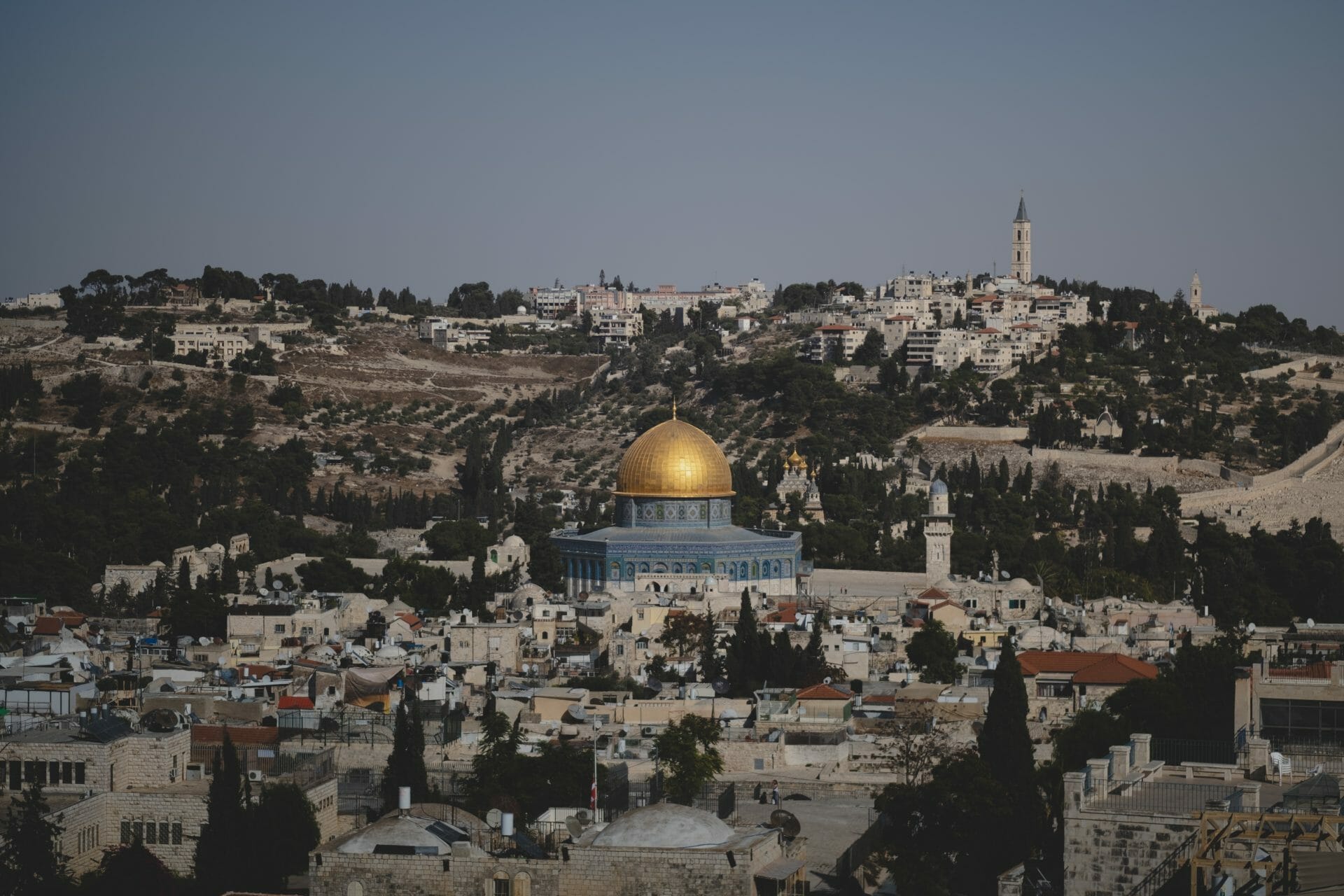
The Dome of the Rock, over the skyline of the Old City of Jerusalem.
Photo by Levi Meir Clancy on Unsplash
This Christmas, praying for a shared Jerusalem
Rev. Dr. Mae Elise Cannon and Jennifer Maidrand
December 17, 2021
In some Christian traditions, people reflect, pray, and enter into joyful anticipation during the season of Advent. As we focus on themes of hope, peace, love, and joy, we often invoke images of the land of the Bible alongside treasured stories that recount the barriers to—and celebration of—Jesus’ birth.
This Christmas season, we have many reasons to pray for peace in the Holy Land, whose present reality exists far from such an ideal.
This year, the people of Jerusalem have not had much peace. From the violent clashes this May between the Israeli military and Muslim worshippers on the Temple Mount (which sparked widespread uprisings throughout the occupied Palestinian territories), to ongoing threats of evictions in the East Jerusalem neighborhood of Sheikh Jarrah, to a recent shooting outside the Temple Mount that was praised by Hamas, Psalm 122’s call to “pray for the peace of Jerusalem” remains as pressing as ever.
Just a year ago, Israeli Defense Minister Benjamin Gantz claimed, “There is room in a united Jerusalem for a Palestinian capital,” which ignited a firestorm of comment in Israel and the occupied Palestinian territories.
One year later, the new Israeli Administration has not made any concrete moves toward negotiating a shared Jerusalem, and the Temple Mount, in particular, has served as a site for much contestation and violence. Rising violence on the Temple Mount, a place holy to Muslims, Jews, and Christians, certainly generates acute concerns regarding the possibility of a shared Jerusalem. For Jews, the site is the location of two ancient temples—both destroyed by foreign rulers accompanying Jewish exile from Israel—where Jews believe the “Holy of Holies” resides. Muslims understand the Temple Mount, known to them as Haram-al Sharif, as the site of the Prophet Mohammed’s ascension to heaven and the third holiest site in Sunni Islam. Christians see the Temple from the Hebrew and Christian Scriptures as the place where Jesus prayed and performed miracles.
The Jordanian Islamic trust, known as the Waqf, regained control of the Temple Mount from the Israeli government following the Six-Day War in 1967. Since that time, the Status Quo agreement governs and controls access to the Temple Mount and several other religious sites in the Holy Land. The Status Quo agreement allows Muslims to pray at the Temple Mount. Similarly, the agreement allows Jews prayer privileges at the nearby Western Wall. After the Status Quo began in 1967, the Chief Rabbinate of Israel forbid Jews from entering the Temple Mount because of the possibility of impurity by being exposed to the dead and cemeteries currently located there (a halakhic prohibition).
In some Christian traditions, people reflect, pray, and enter into joyful anticipation during the season of Advent. As we focus on themes of hope, peace, love, and joy, we often invoke images of the land of the Bible alongside treasured stories that recount the barriers to—and celebration of—Jesus’ birth.
This Christmas season, we have many reasons to pray for peace in the Holy Land, whose present reality exists far from such an ideal.
Although Israel continues to affirm its commitment to upholding the Status Quo in order to ensure overall peace and safety on the Mount and the protection of religious freedom for all, allowing Jewish prayer at the Temple Mount threatens these very goals. Israel’s violations of the Status Quo have tended to permit (and militarily protect) Jewish worshippers on the Mount while endangering Muslim worshippers. In addition to arming the site with a military presence which often incites violence, the Jerusalem Magistrate Court also began permitting Jewish prayer on the Mount. Although the ruling has since been appealed, the approval represents a larger trend that normalizes the actions of far-right Israelis such as the Jewish Temple Movement, who call for a conquest of the Temple Mount and the removal of Palestinians from it.
In a political context where Palestinians are already systematically denied access to their holy sites in the form of road closures, permit restrictions, and entry restrictions (especially for young men), a dismissal of the Status Quo on the Temple Mount presents another impediment in the pathway toward peace in Jerusalem.
The substance of a shared Jerusalem brings up a memory that Christians cherish. A pregnant and not-yet-married Mary gives birth to her baby, Jesus, and lays him in a manger because there was no room for them at the inn. The context of Mary and Joseph’s struggle is one of empire—they travel to Bethlehem to be counted in the emperor’s census and seek refuge in a manger as ethnic-religious minorities. Mary gives birth to her son in a stable because room is not made for her—an unmarried, pregnant, Judean. This Christmas story sows seeds of resilience and hope in the darkest of days. If there is ever a time to pray for a shared Jerusalem, it is now, during this season of sacred contemplation.
The views expressed are those of the authors and not necessarily those of American Baptist Home Mission Societies.


